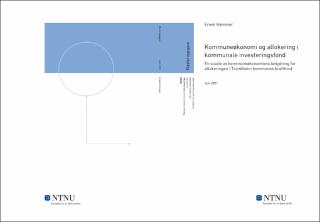| dc.contributor.advisor | Torvik, Ragnar | |
| dc.contributor.author | Hammer, Erwin | |
| dc.date.accessioned | 2021-09-14T17:14:13Z | |
| dc.date.available | 2021-09-14T17:14:13Z | |
| dc.date.issued | 2021 | |
| dc.identifier | no.ntnu:inspera:83798499:35325000 | |
| dc.identifier.uri | https://hdl.handle.net/11250/2777127 | |
| dc.description.abstract | Denne masteroppgaven studerer investeringsmandatet til Trondheim kommunes kraftfond og sammenligner innholdet i mandatet med kjente resultater fra finansteorien. Videre diskuteres faktorer som påvirker allokeringen i kraftfondets portefølje. Spesielt rettes det fokus på hvilken effekt kommuneøkonomien har for allokeringen i porteføljen.
Trondheim kommune kan sees på som en institusjonell investor med eksogen og ikke-omsettbar inntekt ettersom kommunen mottar skatteinntekter og statlige overføringer. I følge finansteorien skal det være mulig for kommunen å jevne ut sitt konsum ved å endre allokeringen i referanseporteføljen så fremt det finnes en samvariasjon mellom inntektene og aktivaklassene.
Ved å bruke inntektsdata fra Trondheim kommune og avkastninger fra referanseindeksene til både SPU og SPNs aksje- og renteportefølje vises det at effekten av å inkludere kommuneinntekter i porteføljevalget er neglisjerbar. I henhold til økonomisk teori tilsier det at allokeringen i kraftfondet isolert sett bør holdes uendret. | |
| dc.description.abstract | This thesis explores the investment mandate of Trondheim municipality's energy fund and compares its content with known results from conventional asset pricing and portfolio theory. Moreover, the thesis discusses topics related to the asset allocation of the fund and how exogenous non-tradable income and other items in the mandate may affect the allocation in reference portfolio.
Trondheim municipality can be regarded as an institutional investor with exogenous non-tradable income as income is receieved from various tax bases and transfer payments from the government. These income streams and their comovement with equities and fixed income may allow for a degree of consumption smoothing by changing the allocation in the reference portfolio provided there is sufficient comovement between income and the asset classes.
Using municipal income data and reference indices for the equity and fixed income portfolios of both Norwegian sovereign wealth funds, the main result is the increase in the risk-adjusted return from including variation in income in the portfolio choice is economically insignificant. The implication of this result is that the allocation in the portfolio should all else equal remain unchanged. | |
| dc.language | nob | |
| dc.publisher | NTNU | |
| dc.title | Kommuneøkonomi og allokering i kommunale investeringsfond
En studie av kommuneøkonomiens betydning for allokeringen i Trondheim kommunes kraftfond | |
| dc.type | Master thesis | |
